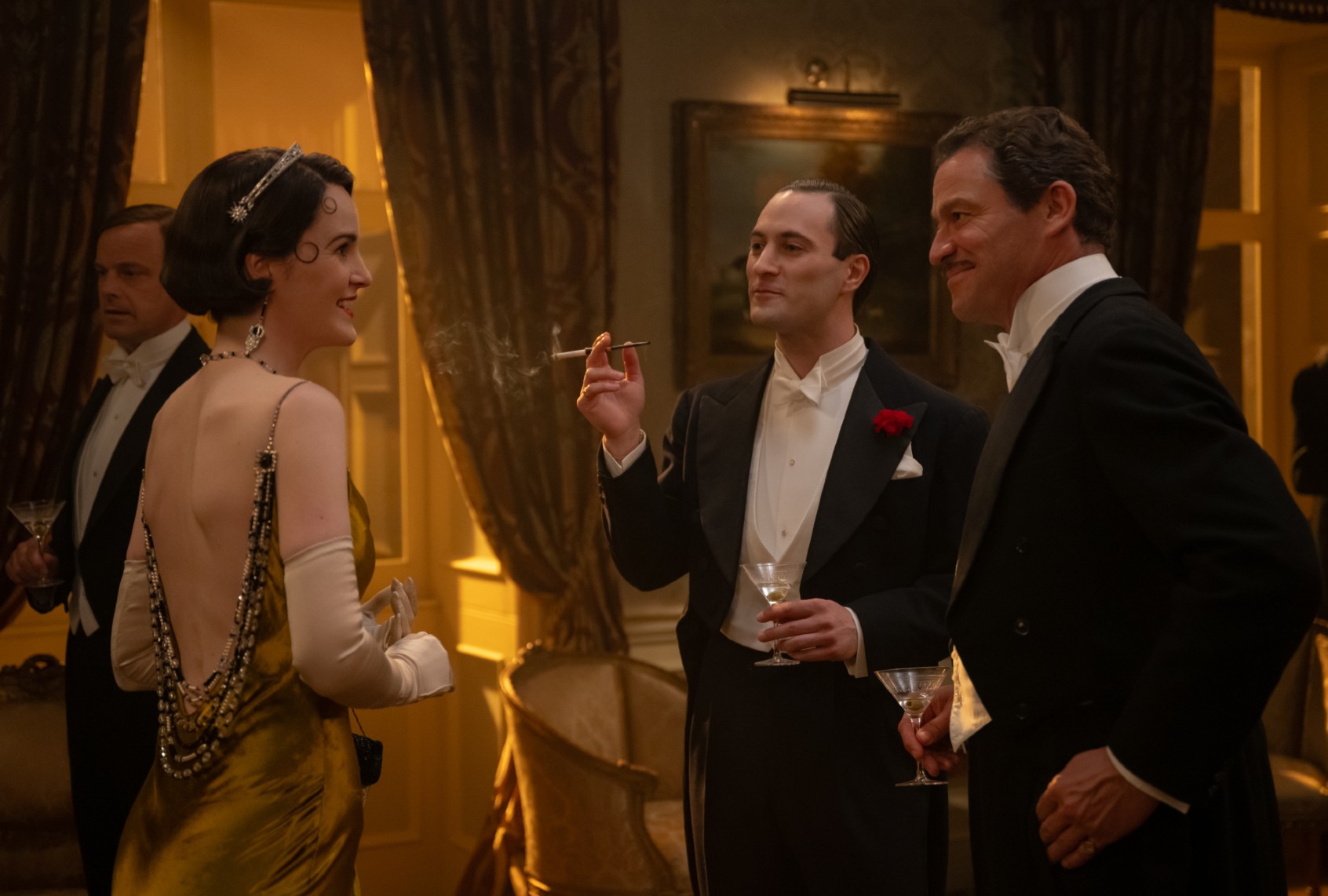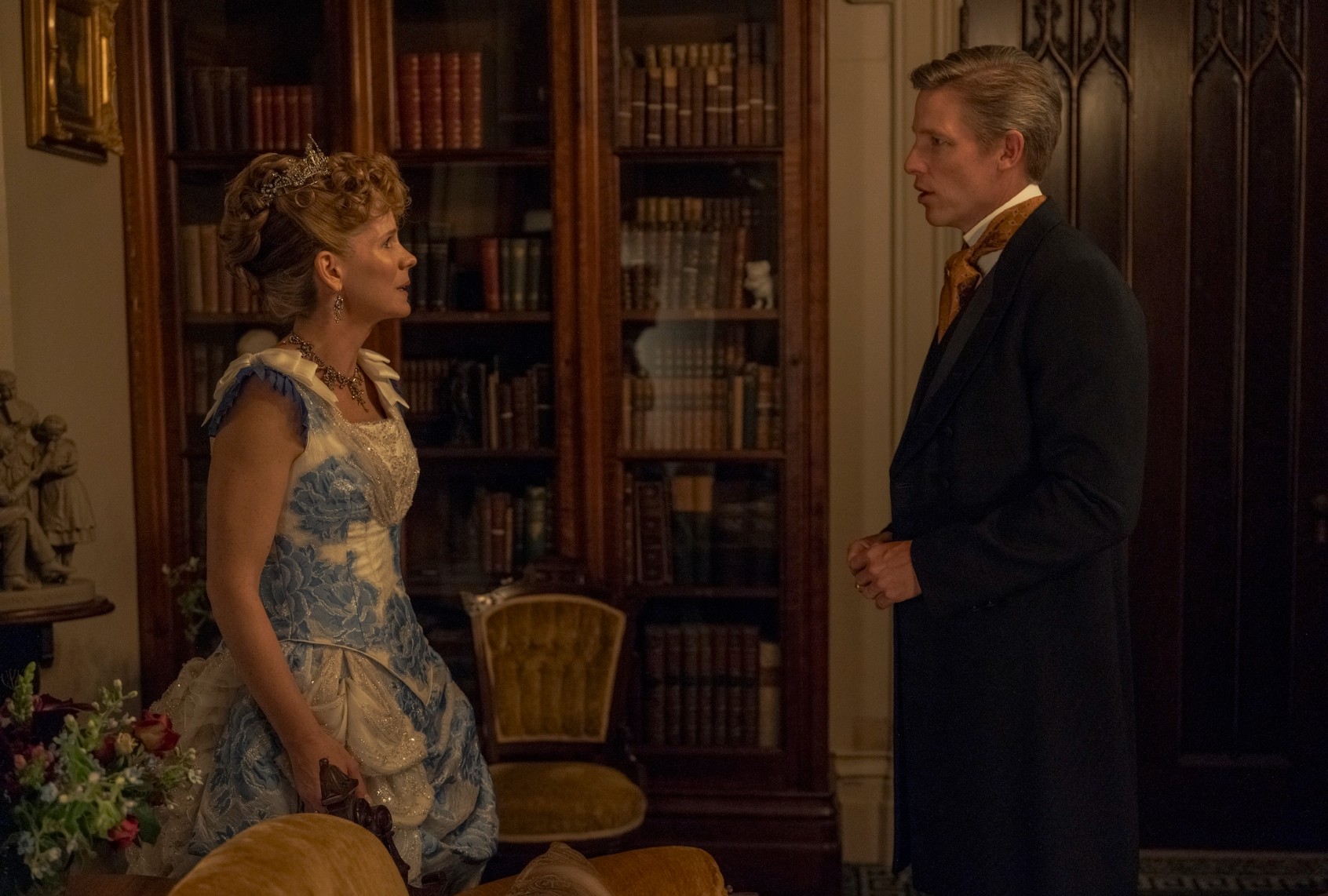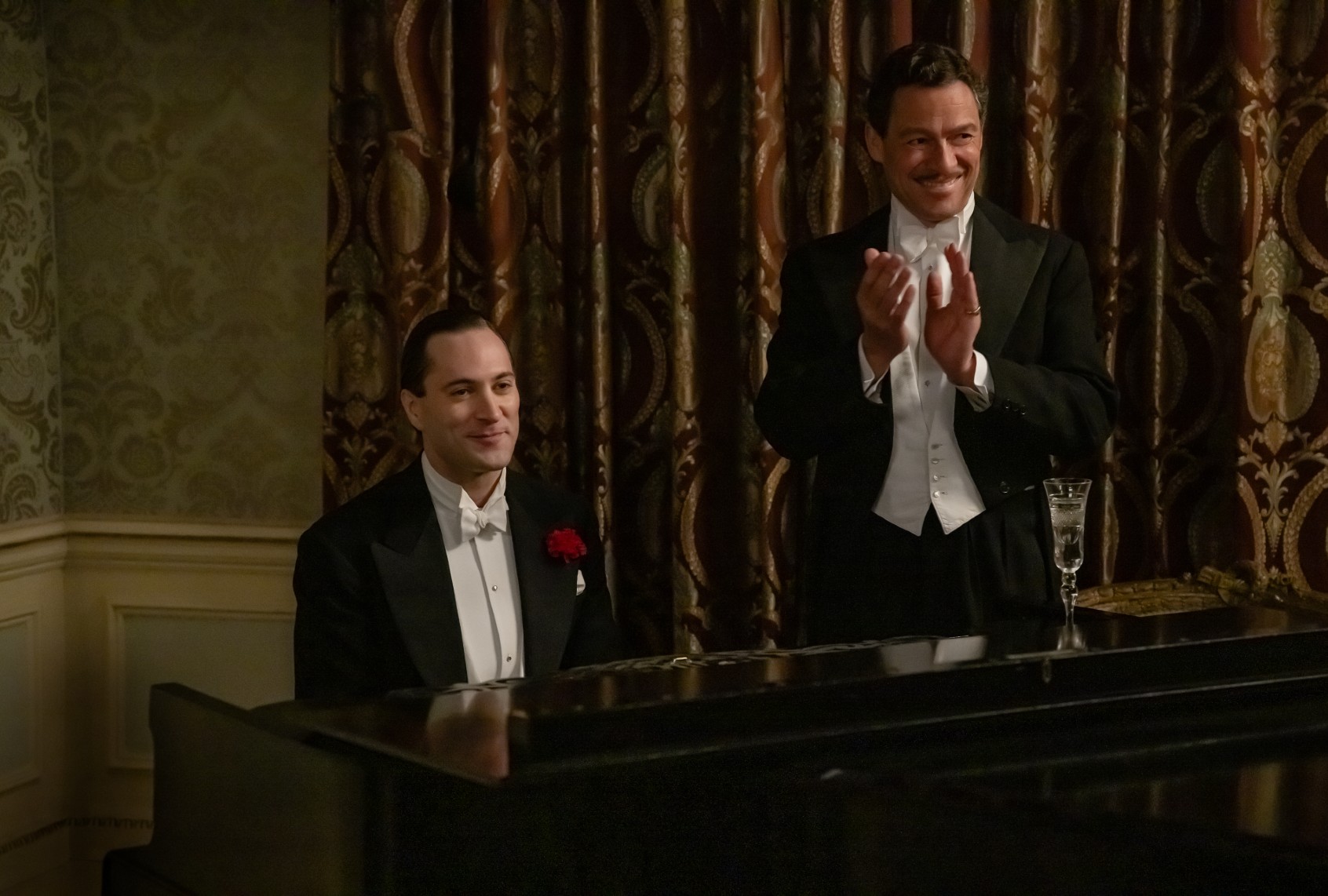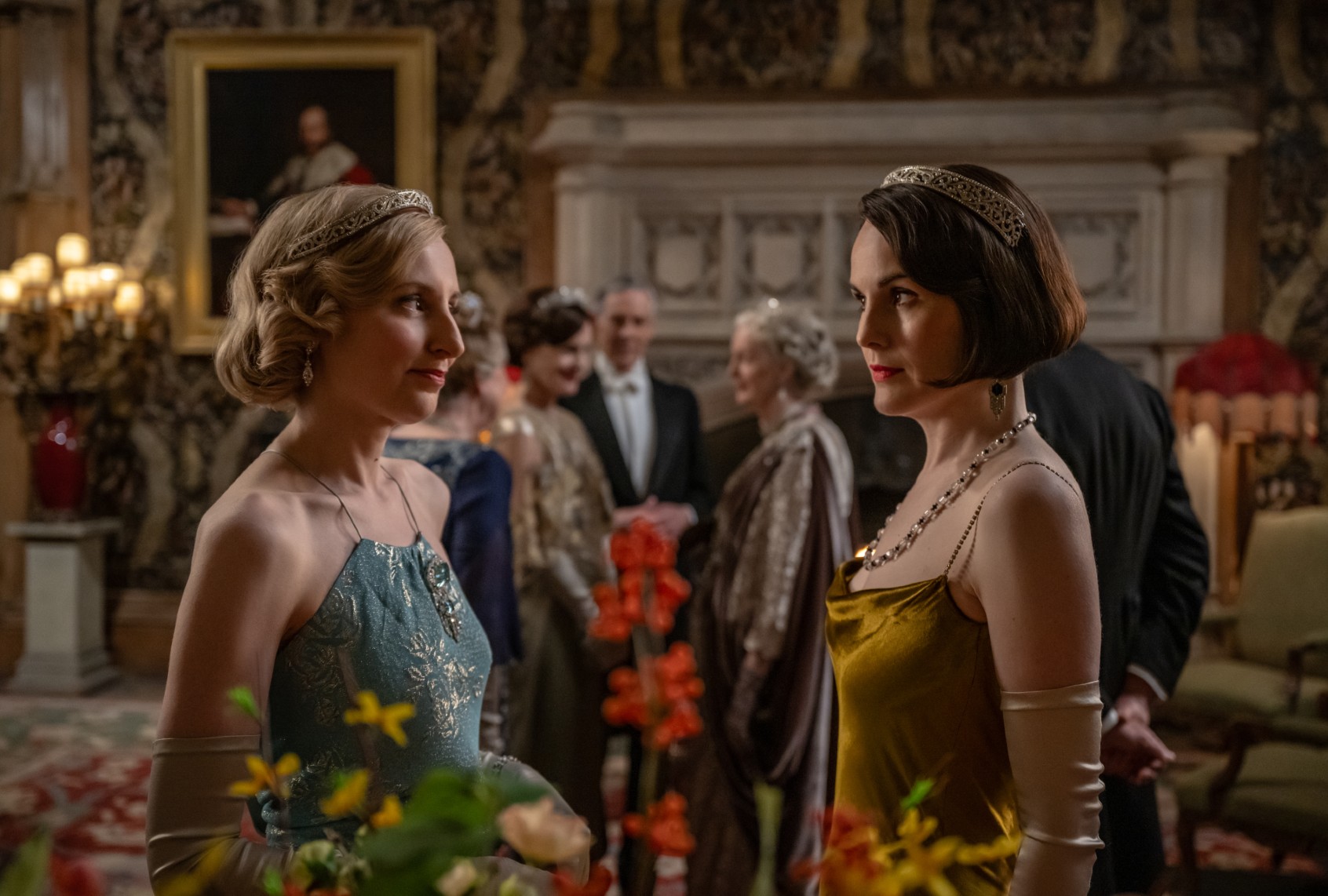Being luckless in love is commonplace these days. But if you’re ever tempted to wallow about it, consider the romantic trials of “Downton Abbey” heroine Lady Mary. Michelle Dockery’s aristocrat lost her virginity to a Turkish diplomat (Theo James) who rudely dies in her bed. The fear of ruin drags on her like shackles.
Lady Mary eventually finds true love and a happy marriage with her cousin Matthew (Dan Stevens), who inconveniently dies shortly after she gives birth to their son and the estate’s heir, George. A few years later, she meets and marries Henry Talbot (Matthew Goode), with whom she has a daughter. But Henry was suspiciously absent from the events of the second “Downton” movie, “A New Era.”
Divorce makes for good drama in any era, but vintage society’s unspoken rules about shunning divorced women seem simultaneously silly, bizarre and mean-spirited.
The franchise’s final act, “Downton Abbey: The Grand Finale,” reveals why in a most humiliating fashion. While Mary and the rest of the family are attending a society ball in London, its host, Lady Petersfield (Joely Richardson), interrupts the merriment to reveal she’s gotten wind of Mary’s divorce. The room literally stops, and Mary, along with her father Robert, Earl of Grantham (Hugh Bonneville) and mother Cora, Countess of Grantham (Elizabeth McGovern), are hastened off the dance floor.
Only they’re not quick enough – a royal arrival forces them to duck under the stairs and hide in the shadows with Mary facing the wall like the pariah she’s instantly become.

(Rory Mulvey/Focus Features) Michelle Dockery as Lady Mary, Arty Froushan as Noël Coward and Dominic West as Guy Dexter in “Downton Abbey: The Grand Finale”
Despite the fairy tales pop culture sells, women have greater odds of getting financially shafted in heterosexual divorces. Socially speaking, today’s divorcées have an industry supporting them, with divorce parties and registries devoted to helping single-again ladies start fresh. Women also tend to keep their closest friendships that they and their former partner mutually enjoyed, too. But not always.
Rewind to the first Gilded Age, as dramatized in HBO’s period drama named for that time, and the story’s reversed: a socialite wife may walk away from a soured union with a pile of cash and no pals to spend it with.
“Downton” creator Julian Fellowes wrote the script for “The Grand Finale,” which Simon Curtis directed; he also created “The Gilded Age,” serving as its co-showrunner. With an aristocratic divorce heating one of that show’s third-season subplots, Fellowes was chewing on something. Divorce makes for good drama in any era, but vintage society’s unspoken rules about shunning divorced women seem simultaneously silly, bizarre and mean-spirited. Ours is an age in which women make their own fortunes and move through the world without men. Yesterday’s countesses lacked those freedoms and were bound to serve as propriety’s standard bearers. Maintaining the picture of happy partnerships and stable families was paramount. For many, that meant putting up with their spouse’s infidelities and abuses.
As long as they held onto the right name, they could wield influence and retain access to exclusive places. Divorce shredded those illusions of superiority and stability, abandoning women to shoulder the weight of scandal regardless of their loyalty.

(Karolina Wojtasik/HBO) Kelli O’Hara and Ward Horton in “The Gilded Age”
In “The Gilded Age,” it’s poor Aurora Fane (Kelli O’Hara), the blameless niece of old-money socialite Agnes van Rhijn (Christine Baranski), whose husband Charles (Ward Horton) announces that he’s been cheating moments before they’re scheduled to leave for the opera. He asks her to sue for divorce, but Aurora refuses, raging that doing so would mean her life as she knows it would be over.
As long as they held onto the right name, they could wield influence and retain access to exclusive places. Divorce shredded those illusions of superiority and stability, abandoning women to shoulder the weight of scandal regardless of their loyalty.
“Things are not as they used to be,” Charles naively says. Aurora corrects him: “Among our people, things are very much as they used to be . . . Do you think I would be welcome in the circles where I am welcome now as a divorced woman?”
“Downton Abbey: The Grand Finale” answers that with a hard no. Once the press gets wind that Mary’s marriage has ended, the gossip is relentless, and the one-time belle of the ball can’t rustle up so much as a small tea party. Not even the stuck-up sire in charge of the local fair wants her stink to rub off on the livestock.
We need your help to stay independent
While “The Gilded Age” takes place in the 1880s, the events of the third “Downton” movie occur nearly five decades later and in Britain, from which New York society copied most of its customs. The changed times became the key to Lady Mary’s salvation, since the stage and cinema also upended the social order. Being seen with actors and playwrights brought another perk of privilege. When Hollywood comes calling in “A New Era,” the franchise’s second feature, it brings a much-needed cash infusion to the Crawleys in exchange for their permission to film at the estate. The collision of worlds changes the fortunes of the family’s closeted butler, Thomas Barrow (Rob James-Collier), who falls in love with screen idol Guy Dexter (Dominic West).
The two happily return in “The Grand Finale” with a third player in tow, a certain celebrated and famously witty playwright.
“We’re living in the age of Noël Coward!” gushes Mary’s sister Lady Edith Hexham (Laura Carmichael), after taking in a production of “Bitter-Sweet” with Robert and Cora. She’s right. In 1930, everybody wants to get next to the sought-after playwright (played by Arty Froushan), which the Crawleys use to their advantage. They invite him and Guy, his star, to a dinner that the Crawleys’ fellow high-class neighbors initially refuse but, hello hello, are suddenly free to attend.
Aurora Fane’s fate is similarly improved by new money empress Bertha Russell (Carrie Coon), who assumes hosting duties for the spectacular ball closing the summer social season in Newport, Rhode Island. Bertha wishes to end the ban on divorcées at society functions, but leaves it up to Mrs. Astor (Donna Murphy), queen of New York’s elite, whose own daughter is also facing divorce, to make that call. In the end, the grand lady sides with her child, making an appearance at the party and diminishing the perceived ignominy tied to ending a marriage.

(Rory Mulvey/Focus Features) Arty Froushan as Noël Coward and Dominic West as Guy Dexter in “Downton Abbey: The Grand Finale”
In both stories, the social magnet of celebrity overcomes ancient traditions that don’t make sense. Our parasocial investment in stars is worlds more fervid, but now that women are also superstars, those old ways are mostly dead as long as you hold sufficient capital. The tally of women who turn out to be better off without their ex’s dead weight includes Martha Stewart; Elizabeth Gilbert, whose first marital breakup let her and us to “Eat, Pray, Love”; and Kim Kardashian, thrice divorced and still very rich both reputationally and financially.
The same goes for Halle Berry, whose dumb ex, former baseball player David Justice, recently went on a podcast and claimed he left her because the actress wasn’t sufficiently domesticated for his tastes. “I’m a Midwest guy. So in my mind, I’m thinking a wife at that time should cook, clean,” he blathered on an episode of “All the Smoke.” “. . . And at that time, as a young guy, she don’t cook, don’t clean, don’t really seem, like, motherly.”
Their divorce was finalized in 1997. Five years later, in 2002, she became the first and only Black woman to win the best actress Oscar for her performance in “Monster’s Ball.” She’s also married and divorced two more times, and still has a healthy career. Oh, and Berry’s a mother, too.
Start your day with essential news from Salon.
Sign up for our free morning newsletter, Crash Course.
Times have changed, but they were already shifting during the actual Gilded Age. Bertha Russell and her husband George (Morgan Spector) are based on William K. and Alva Vanderbilt, that era’s superstars. Alva instigated a society earthquake of her own by initiating a divorce from William once she’d gotten fed up with his flagrant infidelity. What happened to Mary also happened to Alva: her decision to end her marriage gained her a fortune but eradicated her public standing.
That is, until she arranged a union between her daughter, Consuelo, to the Duke of Marlborough, who, like the Earl of Grantham, was broke and in great need of a woman with a fortune. (Bertha pulls the same move with her daughter Gladys, played by Taissa Farmiga, and George is none too pleased about it.) Faced with the choice between sticking to creaky society rules and rubbing elbows with someone a degree or two removed from Queen Victoria, the cream of New York’s elite decided to make nice with Alva again.
“I blaze the trail for the rest to walk in,” Alva declared, as quoted in The Washington Post’s review of Anderson Cooper and Katherine Howe’s book about the Vanderbilts. “I was the first girl of my ‘set’ to marry a Vanderbilt. Then I was the first society woman to ask for a divorce, and within a year, ever so many others had followed my example. They had been wanting a divorce all the time, but they had not dared to do it until I showed them the way.”
“Downton Abbey: The Grand Finale” sets up Lady Mary to enjoy a similarly bold and happy ending. The Crawleys’ exclusive dinner with Noël Coward is an unmitigated success, crowned by Coward serenading her with his hit “Poor Little Rich Girl” and citing Mary as the inspiration for his next play.
Coward even sticks around to thrill the locals at the County Fair the next day, where her former mother-in-law, Isobel Crawley (Penelope Wilton), introduces her to the villagers as Downton’s new great lady. Mary does get her heart bruised again by a duplicitous Yank, but this time she doesn’t mope about it. Instead, she asserts her independence as a woman capable and happy to rule over all she surveys on her own, but assuredly not alone.
“Downton Abbey: The Grand Finale” is currently playing in theaters nationwide.
Read more
about “Downton Abbey” and “The Gilded Age”


